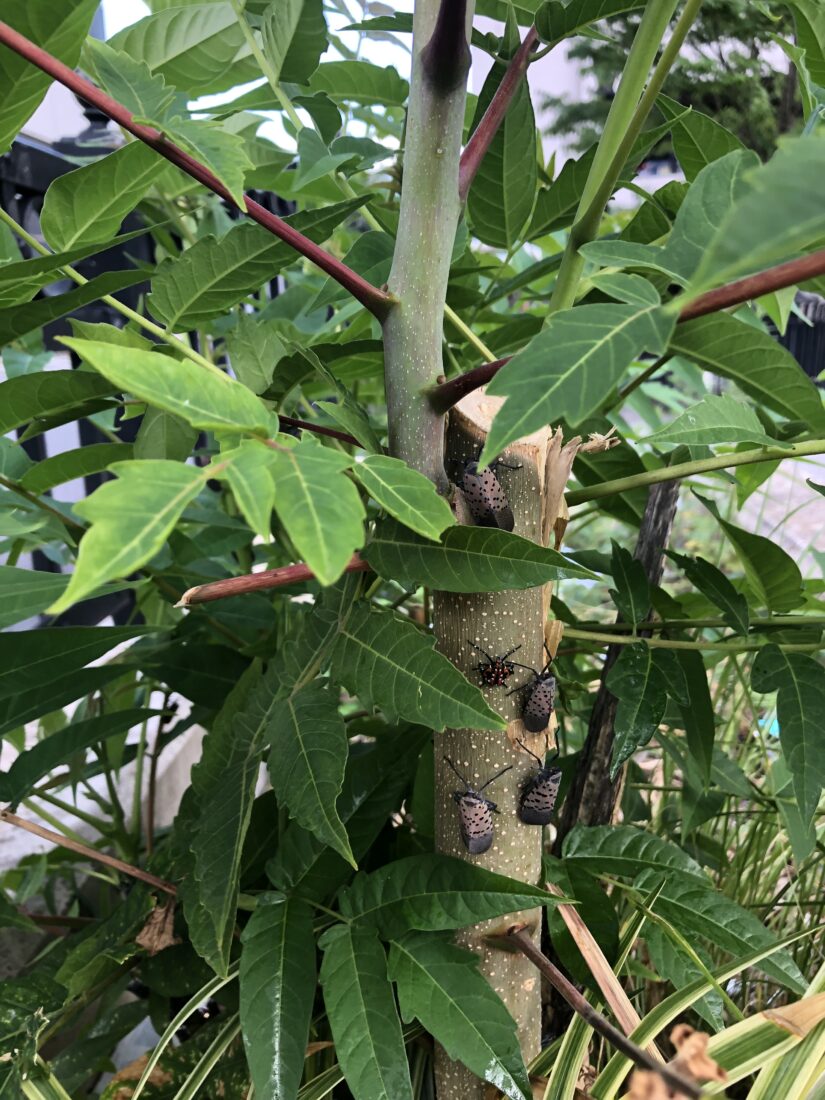Spotted lanternfly infestations begin with the appearance of small, beetle-like nymphs in the spring, which transform into large, destructive hopping insects over the summer. Union County residents can take steps now to help prevent spotted lanternflies from breeding in the fall, and help to reduce the habitat for next year’s nymphs.

“The spotted lanternfly is a widespread problem in New Jersey, Pennsylvania and the surrounding region. Everyone can help reduce the infestation by taking steps to limit their chances of breeding this fall, and by reducing their preferred habitat,” said Union County Commissioner Board Chair Rebecca L. Williams.
Over the last year, the Union County Department of Parks and Recreation has been working with the US Department of Agriculture and the Rutgers New Jersey Agricultural Experiment Station to assess various methods for locating and trapping lanternflies and preventing egg masses from hatching. Circle traps were set up in the Watchung Reservation, and they have already caught thousands of spotted lanternflies.
Union County has also assembled staff from the Department of Parks & Recreation, the Bureau of Shade Tree & Conservation, the Bureau of Mosquito Control, the Bureau of Geographic Information Systems and the Rutgers Cooperative Extension of Union County to focus on fighting the infestation, and the New Jersey Department of Agriculture has awarded Union County a grant to fight the spotted lanternfly on a countywide basis.
The Union County Office of Public Information will provide updates on the work of this task force, and will continue to provide guidance on spotted lanternfly control for residents. A dedicated page on the County website for spotted lanternfly news and updates has been set up at ucnj.org/slf.
Spotted lanternflies lay their eggs in the fall. Residents can help prevent them from breeding now, by stomping on any lanternfly they see.
Residents with trees on their property can use circle traps to catch nymphs in the summer and mature lanternflies in early fall. Lanternflies are known to feed on the sap of 70 different trees and plants, but the ailanthus tree, or Tree-of-Heaven, is their preferred host.
Please note that sticky tape and glue traps should never be used, because they can ensnare birds and beneficial insects. Circle traps are widely available online. They can also be made at home with simple materials.
For more information about circle traps and other environmentally safe methods of trapping nymphs and mature lanternflies, including a link for instructions on do-it-yourself circle traps, visit ucnj.org/slf.
Residents can also reduce the preferred habitat for spotted lanternflies by arranging to have ailanthus trees removed from their property. Because the ailanthus tree is an invasive non-native species, removing it can enable more diverse, native species to grow while also reducing breeding opportunities for the spotted lanternfly.
However, property owners are advised to consult a professional landscape or tree service to remove ailanthus trees. Sprouts and small saplings can be pulled up by the roots, but larger ailanthus trees require professional treatment with an herbicide to prevent them from growing back in greater numbers after cutting.
For information and updates on all Union County services during the COVID-19 outbreak, including free vaccination, free testing, emergency food distribution and other support services, visit ucnj.org/covid19. General information about COVID-19 is available through the New Jersey Department of Health at nj.gov/health.
# #
For all Union County programs and services visit ucnj.org, call the Public Info Line, 877-424-1234, email info@ucnj.org or use the online Contact Form.
Connect with Union County on social media.
